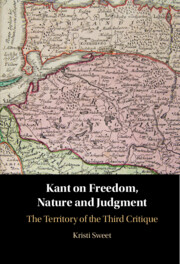Book contents
- Kant on Freedom, Nature, and Judgment
- Kant on Freedom, Nature, and Judgment
- Copyright page
- Dedication
- Epigraph
- Contents
- Acknowledgments
- Abbreviations
- Introduction
- 1 Reason, Hope, and Territory
- 2 Reflection, Purposiveness, Metaphysics
- 3 “Life” and the Ideal of Beauty
- 4 The Sensus Communis and the Ground of the Critical System
- 5 Genius, Aesthetic Ideas, and a Spiritualized Natural Order
- 6 The Domain of Nature as System: Ends
- 7 Hope and Faith: God in the Critique of Teleological Judgment
- Conclusion
- Bibliography
- Index
5 - Genius, Aesthetic Ideas, and a Spiritualized Natural Order
Published online by Cambridge University Press: 07 August 2023
- Kant on Freedom, Nature, and Judgment
- Kant on Freedom, Nature, and Judgment
- Copyright page
- Dedication
- Epigraph
- Contents
- Acknowledgments
- Abbreviations
- Introduction
- 1 Reason, Hope, and Territory
- 2 Reflection, Purposiveness, Metaphysics
- 3 “Life” and the Ideal of Beauty
- 4 The Sensus Communis and the Ground of the Critical System
- 5 Genius, Aesthetic Ideas, and a Spiritualized Natural Order
- 6 The Domain of Nature as System: Ends
- 7 Hope and Faith: God in the Critique of Teleological Judgment
- Conclusion
- Bibliography
- Index
Summary
Chapter 5 treats Kant’s notions of genius and aesthetic ideas. It argues that his discussion of genius forms a kind of deduction for the possibility of producing and then judging objects that exceed our own capacities. In this, it focuses on Kant’s descriptions of spirit as what nature gives both to the genius and thereby also to the work of beautiful art, thus allowing it to enliven our minds. This playful enlivening through spirit is what makes it possible for the human mind to present, in art, what otherwise exceeds it, namely aesthetic ideas. Here, we find that human beings belong to a nature that is much more expansive than the one ruled by the understanding in the first Critique; nature here is the source of spirit and liveliness. The chapter concludes by highlighting Kant’s repeated observations that nature is expressing itself through genius, and links this to the communicability that underlies the judgment of taste more generally.
- Type
- Chapter
- Information
- Kant on Freedom, Nature, and JudgmentThe Territory of the Third <i>Critique</i>, pp. 131 - 156Publisher: Cambridge University PressPrint publication year: 2023

